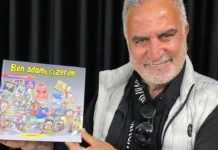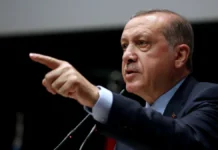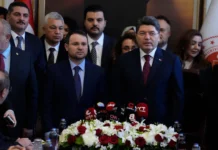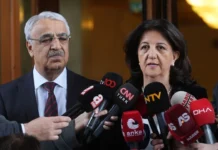One of Turkey’s most famous prisoners appeared in court Friday for what could be his final hearing in a case that has come to define Ankara’s uneasy ties with the West, Agence France-Presse reported.
Paris-born activist and philanthropist Osman Kavala was relatively unknown when he was detained on his arrival at İstanbul’s airport from a trip to a cultural center in the Turkish city of Gaziantep in October 2017.
But his continued imprisonment without conviction has turned the 64-year-old into a hero for President Recep Tayyip Erdoğan’s opponents — and a focus of Western worries about the Turkish leader’s sweeping crackdown on dissent.
Prosecutors demanded last month that Kavala be found guilty of “attempting to overthrow” Erdoğan’s government.
The harshest verdict and sentence would see Kavala jailed for life without the possibility of parole.
“The fact that I have spent 4.5 years of my life in prison is a loss that cannot be compensated,” Kaval told the court by video-link from his high-security prison outside İstanbul.
“The only thing that would console me is the possibility that what I have gone through help to put an end to grave judicial mistakes.”
Kavala’s lawyers expect his sentence to be issued later Friday or Monday.
He stands accused of financing a wave of 2013 anti-government protests and playing a role in a failed but bloody coup attempt against Erdoğan in 2016.
Kavala was acquitted of the first count in February 2020.
But police detained him before he had a chance to return home and then charged him with the coup plot.
Kavala is now facing both charges in a trial that looks back on some of the most tumultuous years of Erdoğan’s dominant 20-year rule.
His claims of innocence have been warmly supported by Western governments and flatly rejected by the Turkish president.
Erdoğan has branded Kavala as a communist agent of the Hungarian-born US philanthropist George Soros who is allegedly using foreign money to try and topple the state.
“We can never be together with people like Kavala,” Erdoğan declared in 2020.
But his treatment has prompted the Council of Europe to launch rare disciplinary proceedings against Turkey that could ultimately see Ankara’s membership suspended in the continent’s main human rights organization.
‘Emblematic case’
Kavala is being tried with 16 other defendants implicated in the 2013 protests.
Nine out of them currently live abroad while the remaining seven took turns on Friday to make their final statements in court.
Defendant Mücella Yapıcı– also facing the threat of life in jail without the possibility of parole — told the court the 2013 protests were the “most democratic, most creative and peaceful collective movement in this country’s history”.
Human rights advocates say Kavala’s release would send a signal to Turkey’s traditional allies that its justice system is free from Erdoğan’s pressure.
“His unconditional release may mark a turning point in de-politicization of judicial prosecutions in Turkey,” Amnesty International’s Turkey researcher Güney Yıldız told AFP.
“That’s why the result of the emblematic case is quite serious.”
Emma Sinclair-Webb of Human Rights Watch called the entire hearing a “show trial”.
But Erdoğan has seethed at the international publicity and condemnation generated by the case.
The tensions nearly caused an all-out diplomatic war when the United States and nine other Western embassies issued a joint letter of support for Kavala last October.
Media reports said Erdoğan’s advisers managed to convince him to walk back on his threat to expel the 10 countries’ ambassadors after being briefed on the harm this might do to Turkey’s investment climate.















